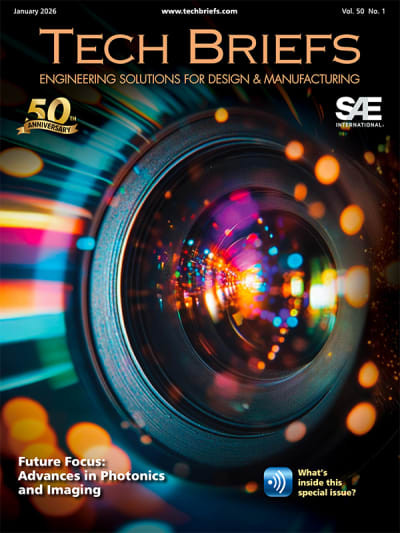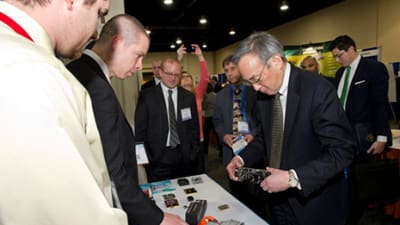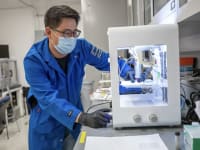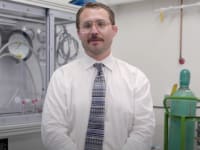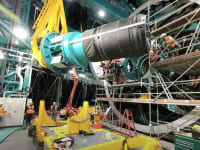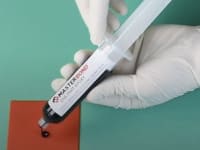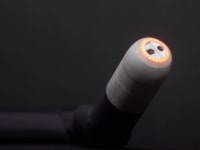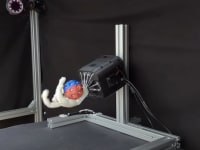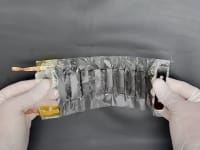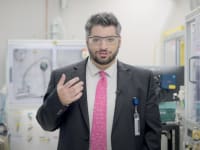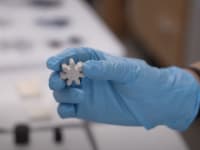61
12,105,170,194,926
-1
3150
30
News
Researchers Turn Smartphone into Handheld Biosensor
University of Illinois at Urbana-Champaign researchers have developed a cradle and app for the iPhone that uses the device’s built-in camera and processing power as a biosensor to detect toxins, proteins, bacteria, viruses and other molecules.
News
Advanced Paper Repels Liquids
By modifying the underlying network of cellulose fibers, etching off surface “fluff” and applying a thin chemical coating, researchers have created a new type of paper that repels a wide variety of liquids, including water and oil.
Question of the Week
Do Social Tools Make Employees More Productive?
According to a recent Microsoft survey conducted by research firm Ipsos, nearly 50% of employees believe social tools make them more productive while more than 30% of companies restrict the use or undervalue them. Typical professional uses for social networks include communicating with colleagues,...
News
New Light-Controlled Hydrogel Has A Future in Soft Robotics
Inspired by the way plants grow toward the sun and light sources, researchers from the University of California, Berkeley have created a hydrogel that is controllable by light.
Blog: Medical
Laser Eye Beams
As the editor of Photonics Tech Briefs, I cover laser technology for a living. They’re pretty fascinating devices, but that doesn’t mean I ever wanted to have a laser beam shot into my eye. Unfortunately, Father Time and our own bodies do not always give us a choice.
I was recently diagnosed as a prime candidate for narrow angle...
News
Waterproof Fabrics Whisk Away Sweat
Waterproof fabrics that whisk away sweat could be the latest application of microfluidic technology developed by UC Davis bioengineers.
Question of the Week
Will 3D Printed Food Help to Solve World Hunger?
Systems & Materials Research Corporation recently received a six-month $125,000 grant from NASA to create a prototype of a universal 3D food printer. The company's creator imagines a day when every kitchen has a 3D printer, and the Earth's 12 billion people feed themselves customized, nutritious...
News
Bug’s View Inspires Digital Camera’s Hemispherical Imaging
Researchers have created the first digital cameras with designs that mimic those of ocular systems found in dragonflies, bees, praying mantises and other insects. This class of technology offers exceptionally wide-angle fields of view, with low aberrations, high acuity to motion, and...
News
Terahertz Technology Sees More with Less
Terahertz technology is an emerging field that promises to improve a host of useful applications, ranging from passenger scanning at airports to huge digital data transfers. Terahertz radiation sits between the frequency bands of microwaves and infrared radiation, and it can easily penetrate many materials,...
News
New Camera Reveals What Snow Looks Like in Midair
University of Utah researchers developed a high-speed camera system that spent the past two winters photographing snowflakes in 3D as they fell – and they don’t look much like those perfect-but-rare snowflakes often seen in photos.
NASA and the U.S. Army helped fund development of the camera,...
News
Thermal Imaging Improves Quality Control of Lithium-Ion Batteries
Purdue University researchers have created a new tool to detect flaws in lithium-ion batteries as they are being manufactured, a step toward reducing defects and inconsistencies in the thickness of electrodes that affect battery life and reliability.
The electrodes, called anodes and...
News
NASA Seeks Innovative Materials
NASA, the U.S. Agency for International Development (USAID), the U.S. State Department and Nike have issued a challenge to identify 10 game-changing innovations that could enable fabric systems to enhance global economic growth, drive human prosperity and replenish the planet's resources.
News
Navy Completes First Carrier-Based Catapult Launch of a Combat UAV
The X-47B Unmanned Combat Air System demonstrator (UCAS-D) completed its first ever carrier-based catapult launch from USS George H.W. Bush off the coast of Virginia. The unmanned aircraft launched from the deck, executed several planned low approaches to the carrier, and safely...
News
Naval Research Lab Shatters Electric UAV Endurance Record
Researchers at the U.S. Naval Research Laboratory flew their fuel-cell-powered Ion Tiger unmanned aerial vehicle (UAV) for 48 hours and 1 minute using liquid hydrogen fuel in a new, NRL-developed, cryogenic fuel storage tank and delivery system. This flight shatters their previous record of...
News
DOE Technique is New Advance in Biofuel Production
Advanced biofuels – liquid fuels synthesized from the sugars in cellulosic biomass – offer a clean, green and renewable alternative to gasoline, diesel and jet fuels. Bringing the costs of producing these advanced biofuels down to competitive levels with petrofuels, however, is a major...
News: Aerospace
Preventing Insect Remains from Adhering to Aircraft Wings
Researchers at NASA's Langley Research Center in Virginia are studying ways to prevent the remains of insect impacts from adhering to the wing of an aircraft in flight. The research is serious, and positive results could help NASA's aeronautical innovators achieve their goals for improving...
News
Nanosystem 'Forest' Achieves Artificial Photosynthesis
Scientists with the U.S. Department of Energy (DOE)’s Lawrence Berkeley National Laboratory (Berkeley Lab) have reported the first fully integrated nanosystem for artificial photosynthesis. While “artificial leaf” is the popular term for such a system, the key to this success was an...
News
3D Design Tool Interprets Hand Gestures
A new design tool interprets gestures, enabling designers and artists to create and modify three-dimensional shapes using only their hands as a "natural user interface," instead of keyboard and mouse.
Question of the Week
Is Warp Speed Possible?
NASA scientists are currently working on the first practical field test toward proving the possibility of warp drives and faster-than-light travel. Thanks to a loophole in the theory of relativity, a ship could theoretically travel in such a way that the universe moves around it, allowing it to reach faraway planets very...
News: Medical
“Transient Electronics” Disappear When No Longer Needed
Scientists recently unveiled a new genre of tiny, biocompatible electronic devices that could be implanted into the body to relieve pain or battle infection for a specific period of time, and then dissolve harmlessly. These “transient electronics,” described at a meeting of the...
Blog: Sensors/Data Acquisition
Explore & Discover with NASA
NASA is one of the top research entities in the world, producing technologies that range from electronics and new materials, to state-of-the-art robotics and sensors. Readers of NASA Tech Briefs get a firsthand look at these new technologies every month. But how many of you have had the chance to go behind the scenes at...
News
Reducing Noise in Qubit Arrays Keeps Quantum Logic Gates Coherent
If quantum computers are ever to be built, qubits will have to be made more robust and more numerous. Qubits, the quantum equivalent of the bits used in conventional computers, can easily lose their orientation in a process called decoherence when confronted with a noisy environment....
News: Imaging
NASA Collaboration Reconstructs Image of Earth
Engineers at NASA's Ames Research Center and amateur radio operators around the world collaborated to reconstruct an image of Earth sent to them from three smartphones in orbit. The joint effort was part of NASA's nanosatellite mission, called PhoneSat.
INSIDER: Energy
Arkansas Power Electronics International Inc. (APEI), a Genesis Technology Incubator client at the University of Arkansas, has developed a prototype battery charger for...
INSIDER: Power
Harish Krishnaswamy, assistant professor of electrical engineering at Columbia Engineering, has generated a record amount of power output—by a power of five—using...
INSIDER: Power
Four solar homes built by students at Missouri University of Science and Technology will soon become home to an experimental microgrid to manage and store renewable energy. The houses,...
News
Researchers Use TEM Imaging to Observe Battery Performance
Researchers at MIT and Sandia National Laboratories have used transmission electron microscope (TEM) imaging to observe, at a molecular level, what goes on during a reaction called oxygen evolution as lithium-air batteries charge. The reaction is thought to be a bottleneck limiting further...
News
Robot Discovers Objects on its Own
Robots can continually discover and refine their understanding of objects, say researchers at Carnegie Mellon University’s Robotics Institute. The Lifelong Robotic Object Discovery (LROD) process, developed by the research team, enabled a two-armed, mobile robot to use color video, a Kinect depth camera, and...
Question of the Week: Electronics & Computers
Can the Desktop PC Market Be Reinvigorated?
As consumers increasingly use cheaper, smaller tablets and
smartphones, a recent IDC report showed that PC sales are down 14% year over year,
and Apple's desktop sales are flat. PCs are still more powerful than competing computing
devices, and still have a prominent role in the enterprise, but...
Top Stories
Blog: Manufacturing & Prototyping
2025 Holiday Gift Guide for Engineers: Tech, Tools, and Gadgets
INSIDER: Research Lab
Scientists Create Superconducting Semiconductor Material
Blog: Software
Quiz: Materials
Blog: Aerospace
Tech Briefs Wrapped 2025: Top 10 Technology Stories
Blog: Manufacturing & Prototyping
Webcasts
 Upcoming Webinars: AR/AI
Upcoming Webinars: AR/AI
The Real Impact of AR and AI in the Industrial Equipment Industry
 Upcoming Webinars: Motion Control
Upcoming Webinars: Motion Control
Next-Generation Linear and Rotary Stages: When Ultra Precision...
 Upcoming Webinars: Energy
Upcoming Webinars: Energy
Hydrogen Engines Are Heating Up for Heavy Duty
 Podcasts: Medical
Podcasts: Medical
How Wearables Are Enhancing Smart Drug Delivery
 Podcasts: Power
Podcasts: Power
SAE Automotive Podcast: Solid-State Batteries
